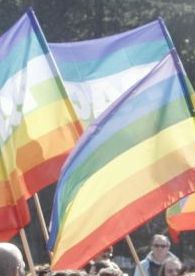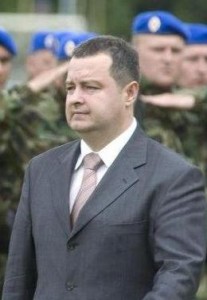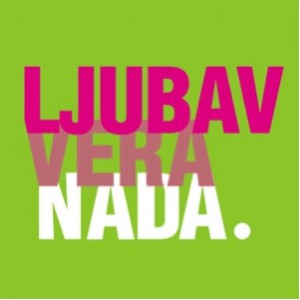Will Rights or Riots Triumph in Belgrade?
 After the human rights sham(e) of the Serbian government’s eleventh hour decision to ban Belgrade Pride 2011, there is concern that the country could be on the brink of flouting international conventions again this year. If the authorities do buckle under pressure from agitators and right-wing groups, it could bring the government into conflict with the Council of Europe over the fundamental right of assembly. Serbia’s own Constitutional Court might take issue with it, too.
After the human rights sham(e) of the Serbian government’s eleventh hour decision to ban Belgrade Pride 2011, there is concern that the country could be on the brink of flouting international conventions again this year. If the authorities do buckle under pressure from agitators and right-wing groups, it could bring the government into conflict with the Council of Europe over the fundamental right of assembly. Serbia’s own Constitutional Court might take issue with it, too.
When the government cited security issues for the last minute cancellation of last year’s event (although nobody has been charged with any associated crime) it was humiliated for being unable to protect people on the streets of its own capital. It was also seen to be riding roughshod over the country’s constitution and received widespread international condemnation for its inability to defend human rights.
Dačić Gets His Ducks In A Row
The fear now is that Prime Minister Ivica Dačić is getting his ducks in a row for a similar government clamp down on this year’s Belgrade Pride Parade, scheduled for Saturday 6 October. The theme for this year’s week-long programme of events is Love, Faith & Hope.
 Ivica Dačić, a former spokesman for disgraced Serbian leader Slobodan Milosević, voiced his general support for this year’s Parade during an interview for Kažiprst on B92 TV, this week. But he added a worrying caveat: “I do support that parade and the ban on discrimination, but this is a security issue,’ Prime Minister Dačić said. “I wouldn’t think of sacrificing the lives of those people and of the police officers.”
Ivica Dačić, a former spokesman for disgraced Serbian leader Slobodan Milosević, voiced his general support for this year’s Parade during an interview for Kažiprst on B92 TV, this week. But he added a worrying caveat: “I do support that parade and the ban on discrimination, but this is a security issue,’ Prime Minister Dačić said. “I wouldn’t think of sacrificing the lives of those people and of the police officers.”
What Prime Minister Dačić appears to be saying in this interview is that the Serbian government will respect human rights, but only as long as the security forces give the go ahead. It is believed that threats have already been issued against next month’s parade and Pride organisers have called on the Prime Minister to reveal the names of these criminals, as well as what moves are being made to prosecute those who have threatened violence.
“Bearing in mind that the lives of Pride participants, police officers and all other citizens of Serbia are a priority and that there is a consensus that the violence is a problem of the entire society, the Organization Committee expects the Prime Minister to undertake all necessary activities in the following month, in order to enable the prosecution of those individuals who are preparing any kind of violence,’ said Belgrade Pride boss Goran Miletić.
Ringleaders in Hate Crimes
It is widely believed that police know the ringleaders in these hate crimes, but no criminal prosecution has been successfully brought for the threats that the state used to ban last year’s Belgrade Pride.
Obviously, safety should be paramount but ‘security’ should not be used to trample human rights. A government should not fan the flames of fear to smokescreen the influence of outside forces.
If Dačić and his ministers intend to ban the parade, it would not only seem to be contradictory to the country’s constitutional commitments (which protect the right of assembly), it would stick up two fingers to the Council of Europe. Under Serbia’s own constitution and as a member of the Council of Europe, Serbia has a commitment to protect fundamental human rights and freedoms for all citizens. These include the cornerstone right of assembly, as well as an obligation to provide the necessary means to protect people in peaceful assembly.
A Basic Presumption of Democracy

“The freedom of peaceful assembly is a basic presumption of democracy and it should not depend on security agencies’ assessments, nor can the right to life be protected by breaching constitutional rights and laws,’ said Goran Miletić.
People around the globe have stood up to abuse of their fundamental human rights and governments have seen that it is no longer acceptable to ignore their obligations to allow people to assemble, to protest and to walk the streets without fear.
No such luck for Serbia’s LGBT community, though. Despite months of preparation and scores of meetings between Belgrade Pride organisers, police and the authorities, the government pulled the plug on last year’s event because of alleged security issues.
Well-publicised homophobic counter-protests had been planned by right-wing organisations, as well as events by some church and family groups.
A case against the Serbian State is still before the European Court for Human Rights, while Serbia’s Constitutional Court declared the government’s decision to place unrealistic restrictions on the 2009 Parade to be ‘unconstitutional.’
The European Court for Human Rights has also ruled on the banning of Pride Parade in Poland, Russia and Moldova, declaring in all three cases that the state may not obstruct the parade, regardless of the ‘unpopularity of the event’ or any ‘security aspects’.
Unconstitutional Ban in Serbia
“High-risk gatherings, such as football matches and similar, have never been banned due to the safety risk,’ said Goran Miletić. “On the contrary. In such cases, the police were engaged appropriately in advance in order to both protect the citizens and the property and to secure the event. Unlike the traditionally secured football matches, Belgrade Pride was banned in 2009 and in 2011, while the Constitutional Court ruled in December that the 2009 ban was unconstitutional, stressing that the ban breached the constitutional right of assembly.”

It remains to be seen what effect these recent court decisions will have on Belgrade Pride Parade 2012 (scheduled for Saturday 6 October). Despite paying lip service to the country’s EU aspirations, Serbia’s current leadership is a tougher nut to crack than pro-Western Boris Tadić, so it remains to be seen how far Tomislav Nikolić and his government is willing to go to protect human rights in Serbia. A ban will definitely attract condemnation from human rights groups and the international community. But, as has been seen before, such things do not usually bother Serbia.


No comments yet.
Be first to leave your comment!